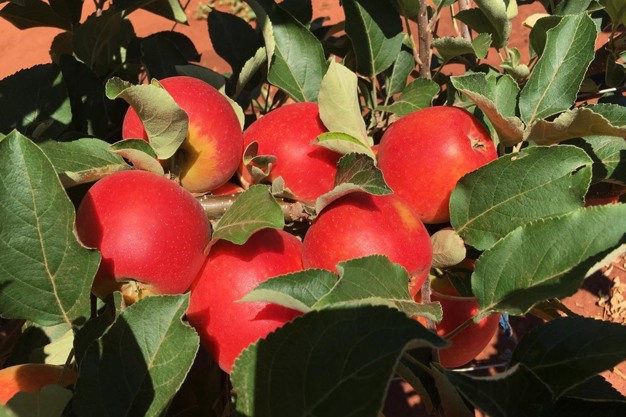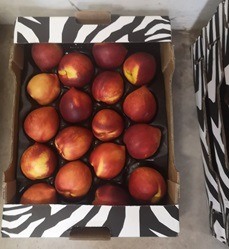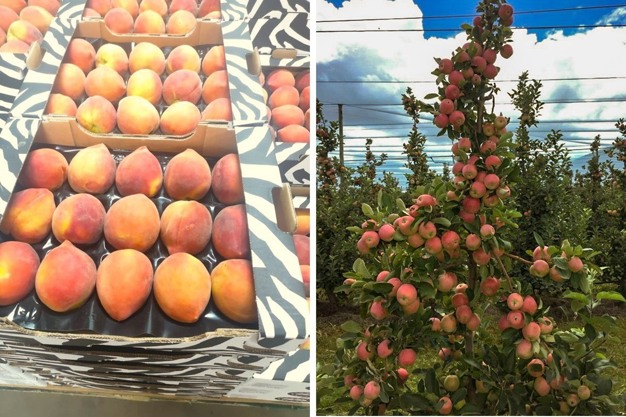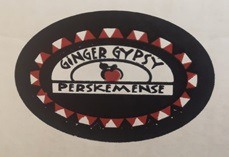The 2024/2025 apple harvest is looking great, remarks Müller Oosthuizen of Ginger Gypsy in the Waterberg region of Limpopo. He reckons the severe July frost, which cut their peach and nectarine crop by half, was a boon to their apple orchards.

The early apples are looking "outstanding", saya Müller Oosthuizen, perhaps as a result of the sharp July frost
"The sharp cold towards the end of winter led to a severe loss in peach and nectarine crop in our orchards but the apples seem to have enjoyed the cold. They're really looking outstanding. If all goes well, we'll market around 400 tonnes of apples."  Ginger Gypsy is ending their stone fruit campaign (peaches and nectarines only, they grow no plums) as the Cape stone fruit crop reaches its high summer peak.
Ginger Gypsy is ending their stone fruit campaign (peaches and nectarines only, they grow no plums) as the Cape stone fruit crop reaches its high summer peak.
The peaches and nectarines, among the very earliest available from South Africa, are exported to the Middle East and the Far East (not China – yet) and the Indian Ocean islands, as well as packed for retailers Checkers and Woolworths.
Likewise, the apple harvest kicking off this week will end in roughly two months when Free State apples start rolling across the packline. Early in and early out is Ginger Gypsy's motto.
"The apple industry in the Transvaal has the potential to grow and become almost as large as the Free State's apple industry," Oosthuizen remarks; the Free State grows the earliest Gala and other conventional apple types. In Limpopo the orchards are mostly based on the local Afri-range of low chill genetics, but also, increasingly genetics from other parts of the world, since the Agricultural Research Council's Afri Apple breeding programme has been shuttered.
These northern and super-early apples enjoy a major advantage over the last Cape apples that spent the last half a year in energy-intensive controlled atmosphere rooms. "What is the route into Africa, which takes around half of South Africa's apples? One of the ways is through Botswana – and Botswana is nearly 80km from our production area."
He continues: "The trucking cost for a load from Cape Town to Johannesburg is R62,000 [3,250 euros] out of the Cape apple farmer's pocket, and only then he starts on the intra-African leg of the journey. Our region's apples are minus storage costs minus the transport cost and it's freshly harvested."
Ginger Gypsy's apple orchards took some time to settle in, but he says now the eating quality is fantastic. New strains of traditional pear varieties are being trialed for summer rainfall areas; he's excited by the results from early pears.
Two difficult years in succession for stone fruit He observes that this year and the last have been poor stone fruit years, and that brings the unavoidable matter of climate change to mind.
He observes that this year and the last have been poor stone fruit years, and that brings the unavoidable matter of climate change to mind.
Climate change will disproportionately affect the Western Cape, he says, and stone fruit farmers are readying for a shift from the high chill "race horses" to the less demanding and more adaptable "mules".
In some stone fruit varieties, both in the Cape and in the north of the country, very little fruit was brought to maturity this season by cultivars unable to cope with erratic fluctuations in temperature and rainfall. "Certain genetic lines have shown themselves more resilient under erratic conditions. These fluctuations in temperature and rainfall patterns are one of the biggest problems of climate change."
Trials into medium and low-chill stone fruit continue apace in the Western and Eastern Cape, and also in the Provar trial blocks (including pears for the Northern production area) on behalf of the summer rainfall areas.
For ore information:
Müller Oosthuizen
Ginger Gypsy
Tel: +27 87 820 7155
